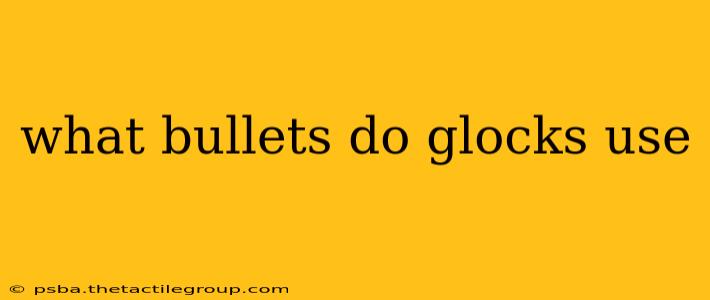Glocks are renowned worldwide for their reliability and popularity, but understanding the ammunition they use is crucial for safe and responsible gun ownership. This guide clarifies the types of bullets, or more accurately, cartridges, compatible with Glock handguns. It's important to remember that always consulting your firearm's owner's manual is paramount before handling or firing any weapon. This information is for educational purposes only and should not be considered a substitute for professional firearm training.
Understanding Glock Calibers: More Than Just "Bullets"
The term "bullet" often gets misused. A bullet is the projectile itself, the piece of metal that exits the barrel. What you need to know about Glocks relates to cartridges, which are the complete self-contained units including the case, primer, propellant, and the bullet. Glocks are available in a range of calibers, each using a specific type of cartridge:
-
9x19mm Parabellum (9mm Luger): This is arguably the most common caliber for Glocks and is incredibly popular for self-defense and law enforcement. It's a relatively versatile round with a wide variety of bullet weights, types (full metal jacket, hollow point, etc.), and manufacturers.
-
.40 S&W (40 Smith & Wesson): A powerful cartridge offering more stopping power than 9mm, but with increased recoil. It's a common choice for law enforcement, but its popularity has waned somewhat in recent years.
-
.45 ACP (45 Automatic Colt Pistol): Known for its large diameter and significant stopping power, .45 ACP is favored by some for its perceived effectiveness. However, it also boasts noticeably more recoil than smaller calibers.
-
10mm Auto: A powerful cartridge often considered the "big brother" to .40 S&W, offering substantial stopping power, but with significant recoil.
-
.380 ACP (9x17mm): A smaller, less powerful cartridge often found in compact Glocks, suitable for concealed carry but offering less stopping power than larger calibers.
-
.22 LR (22 Long Rifle): While less common in Glock pistols, certain models are chambered in .22 LR, offering a lower-recoil option suitable for training or plinking.
Bullet Types Within Each Caliber
Within each of these calibers, numerous bullet types exist. Some common types include:
-
Full Metal Jacket (FMJ): These bullets have a full metal casing covering the projectile, generally resulting in higher penetration and lower expansion.
-
Hollow Point (HP): These bullets have a hollow cavity in the tip, designed to expand upon impact, leading to increased stopping power and reduced penetration.
-
Jacketed Hollow Point (JHP): Similar to HP, but with a metal jacket over the hollow point, offering a balance between expansion and penetration.
-
Soft Point (SP): These bullets have a soft lead tip, designed to expand upon impact.
Choosing the right bullet type depends on the intended use of the firearm. This is an extremely important decision that should be made in consultation with a firearms expert.
Safety First: The Importance of Ammunition Selection
Choosing the correct ammunition for your specific Glock model is absolutely crucial for safety and functionality. Using the wrong caliber can lead to catastrophic malfunctions, serious injury, or even death. Never attempt to fire ammunition in a firearm not specifically designed for that caliber.
Always verify the caliber marking on your Glock and ensure that the ammunition you purchase matches exactly. Pay close attention to the markings on both the firearm and the ammunition packaging.
This guide provides a basic overview. Further research and professional training are strongly recommended for anyone handling firearms. Safe gun handling practices should always be prioritized.

